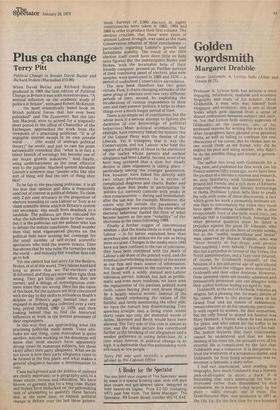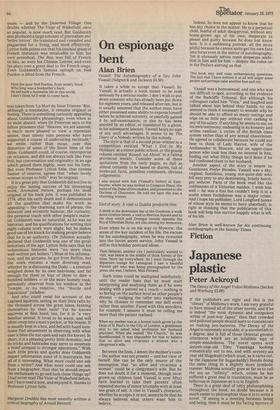Golden wordsmith
Margaret Drabble
Oliver Goldsmith, A. Lytton Sells (Allen and Unwin £6.75).
Professor A. Lytton Sells has written a most engaging, informative, readable and eccentric biography and study of his Subject, Oliver Goldsmith, a man who was himself both enigmatic and eccentric: this is one of those books which gain interest from a sense of shared enthusiasm between subject and author. Not that Lytton Sells entirely approves of Goldsmith: on the contrary, one of his professed reasons for writing the work is that other biographers have glossed over personal faults, as well as failing to confront the real obscurities of his career. But he chides him as one would chide an old friend: why did he neglect his poor and ailing mother, why didn't he do the sensible thing and accept a government job? The author has lived with Goldsmith for a long time, and published his first work (on his French sources) fifty years ago, so we have here the product of a lifetime's interest and research, an easy familiarity with Goldsmith's background and friends, and a rich store of hitherto unspotted references and literary borrowings or thefts. Professor Lytton Sells likes to credit his wife with some of these discoveries, a fact which gives his work a pleasantly intimate air: one likes to contemplate the years they must have spent discussing Goldsmith. He is also exceptionally fond of the little word (sic), :aut. perhaps that is Goldsmith's fault. Amongst his other personal qualities must be listed a prejudice against the great Dr Johnson, who emerges not at all as the hero of recent works, but as the "sordid, supercilious and brutal" man observed by Horace Walpole, who was "more beastly in his dress and person than anything I ever beheld." Professor Sells also has a prejudice in favour of the Tories, the North administration, and a Tory view (shared, of course, by Goldsmith himself), of the beauties of a pre-industrial age of agricultural economy, before the villages were deserted by Goldsmith and their other denizens. However, these personal views are frankly admitted and persuasively presented: one can disagree with their author without feeling enraged by him. Goldsmith, at the end of the book, remains an enigma, but a pleasing one. So many details of his career, down to the precise dates of his Grand Tour and his means of subsistence, remain obscure: so do his emotions, particularly with regard to women. He died unmarried, but the only friend to attend his funeral was Mary Horrieck, a friend whom he had known for years, and who asked for the coffin to be opened, that she might have a lock of his hair. The author declares that their relationship cannot be understood and that we know nothing of his inner life. An account even ot his external life is complicated by the fact that Goldsmith was a romancer. It is dangerous to trust the word even of a scrupulous diarist, and Goldsmith, far from being scrupulous, was an inventor, a fantasist, a story-teller.
I had not appreciated, until reading this biography, how much Goldsmith was a literary jack-of-all-trades: in short, a hack. It is interesting that one's admiration for him is increased rather than diminished by this realisation. He is known today largely by his plays — oddly enough, one of them, The Good-Natured Man, was produced in 1971 at the Old Vic, for the first time for two hundred
years — and by the Deserted Village. One doubts whether The Vicar of Wakefield, once so popular, is now much read. But Goldsmith• also produced a large amount of journalism and 'belles lettres'. He translated and compiled and plagiarised for a living, and most effectively Lytton Sells points out that his unusual grasp of French literature was invaluable to him; his own periodical, The Bee, was full of French tit-bits, so were his Chinese Letters, and even his plays owe a great deal to the French stage. Even Goldsmith's famous epitaph on Ned Purdon is lifted from the French:.
Here lies poor Ned Purdon, from misery freed.
Who long was a bookseller's hack; He led such a damnable life in this world, I don't think he'll wish to come back.
was taken from `La Mort du Sieur Etienne.' But, although a translation, it remains original in feeling. There is something curiously appealing about Goldsmith's phraseology, even when at its most absurd: when Dr Primrose says to his fellow prisoners that "Heaven, we are assured, is much more pleased to view a repentant sinner, than ninety nine persons who have supported a course of undeviating rectitude," we smile, rather than moan, over this distortion of some of the finest lines of the Bible. Goldsmith could, of course, extemporise on occasion, and did not always talk like Poor Poll, but conversation and originality, in an age which priced them highly, were not his forte. But even Professor Lytton Sells, that tireless hunter of sources, agrees that "when lovely woman stoops to folly" may be original.
It is a great pity that Goldsmith did not live to enjoy the lasting success of his interesting work, Animated Nature, perhaps the most original of his hack jobs. It was published in 1774, after his early death and it demonstrates all the qualities that make his work so appealing — the charming turn of phrase, the innocent and eccentric humour, the curiosity, the personal touch with other people's material. Goldsmith was no naturalist, as he was no historian, and his qualifications for writing this eight-volume work were slight, but he makes good use of his knack for making people believe that he is an authority. (Dr Johnson actually declared that Goldsmith was one of the great historians of the age: Lytton Sells says that his voluminous histories were "no more than well-written pot boilers.") Most of his information, and his pictures, he got from Buffon, but the work remains a most diverting read, whether he is discussing the Dodo — a creature. weighed down by its own heaviness, and fat enough for three or four of them to dine a hundred soldiers — or the more homely rook, personally observed from his window in the Temple, or its relative, the "docile and loquacious" jackdaw. And who could resist his account of the Lapland squirrels, sailing on their little rafts by the thousand across the great lakes, fanning themselves by their tails? Yet he knows squirrels at first hand, too, for it is "a very familiar animal. It loves to lie warm, and will often creep into a man's pocket, or his bosom. It is usually kept in a box, and fed.with hazel nuts. Some find amusement in observing with what ease it bites the nut open and eats the kernel. In short, it is a pleasing pretty little domestic; and its tricks and habitudes may serve to entertain a mind unequal to stronger operations." With such little pricks and quirks does Goldsmith impart information some of it inaccurate, but all of it interesting. What more could one ask from a writer? And what more could one ask from a biographer, than that he should impart the enthusiasm to go and look these things up? I had never read The Vicar of Wakefield before, but I have read it now, and enjoyed it, thanks to Professor Lytton Sells.
Margaret Drabble has most recently written a critical biography of Arnold Bennett.



























 Previous page
Previous page